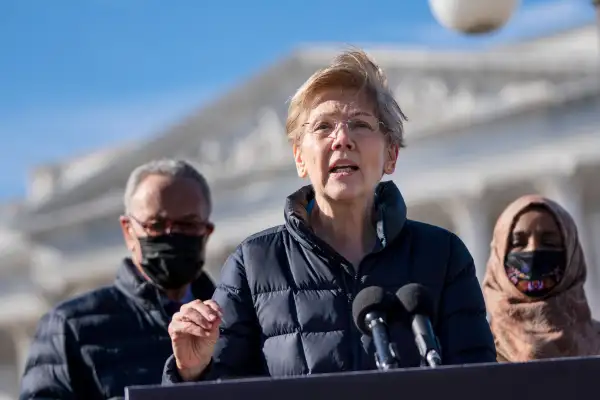Here's How Many Borrowers Could See Their Student Debt Wiped Out If Biden Cancels $50,000

Roughly 80% of federal student loan borrowers would see their debts completely wiped out if the government cancels $50,000 of student loans.
That’s based on data released Tuesday by Massachusetts Sen. Elizabeth Warren, based on questions she submitted to the U.S. Department of Education earlier this month.
Warren is a vocal part of a group of Democratic lawmakers and consumer advocates who are pushing the Biden administration to use executive authority to cancel $50,000 of student debt per borrower. President Joe Biden, meanwhile, has said he thinks $50,000 is too large an amount.
The new data from the Education Department show that of the 44.9 million borrowers with federal Direct Loans and FFEL program loans, 36 million would have their debt completely forgiven under the $50,000 of cancellation proposal. That would include 9.8 million borrowers who are delinquent or in default on their loans, and it would also wipe out the debt of more than 3 million borrowers who’ve been repaying their loans for 20 years of more.
If the government forgives $10,000 — the amount that Biden has repeatedly said he’s comfortable with — the number of borrowers whose debt is completely forgiven drops to 15 million, or about 33% of all borrowers. The data don't break down the numbers by the type of loan debt, so it's hard to say how much of the amount forgiven would be for undergraduate debt, graduate school debt or loans taken on by parents.
Warren shared the Education Department data ahead of a Senate committee hearing Tuesday that focused on student loans and the pros and cons of cancellation.
"America is facing a student loan time bomb that, when it explodes, could throw millions of families over a financial cliff," Warren said in her opening statements.
During the hearing, Democratic Rep. Ayanna Pressley of Michigan and Dominque Baker, assistant professor at Southern Methodist University, focused on the racial justice element of debt cancellation. Years of research has shown that Black students borrow more and struggle more with repayment than white students.
"This is not due to some innate issue within Black people," Baker said in her testimony. The "student loan burden disproportionately falls on these students due to centuries of structural forces pushing for this outcome." She noted how Black families haven't had the same opportunities to build wealth as white families, which limits their ability to pay for college. And how after college, Black graduates face a discriminatory labor market.
Yet the three economists selected as witnesses for the hearing were far less supportive of the idea of universal loan forgiveness.
Adam Looney, a professor at the University of Utah, and Constantine Yannelis, a professor at the University of Chicago, both called widespread student loan cancellation an expensive policy that disproportionately favors the well-off. It'd only help people who enrolled in college — who tend to be better off than those who don't attend college — and the majority of the money would go to well-educated, high-earning college graduates. (Advocates for debt forgiveness counter that even high earners who carry student debt often have negative overall wealth.)
Economist Beth Akers, a resident scholar with the American Enterprise Institute, meanwhile, said the government should focus instead on fixing the problems with its income-driven repayment system, which already offers some forgiveness to borrowers who haven't earned enough to pay off their debts after at least two decades. Jack Remondi, CEO of student loan servicer Navient, also stressed the need to improve these repayment plans in his testimony.
Aside from the amount of debt cancelled, the other big question is how the government should do it. Biden has said he’d preferred to work with Congress, and that he’s skeptical he has the power to cancel so much debt via executive action. Still, his Chief of Staff Ron Klain said earlier this month that the White House had asked Education Secretary Miguel Cardona to prepare a memo on the legality of loan cancellation through the executive branch.
During the hearing Tuesday, Massachusetts Attorney General Maura Healey, who’s focused multiple of her investigations on protecting student loan borrowers in her state and supports loan forgiveness, said in her legal opinion, the president does have executive authority to cancel debt.
The timeline for potential loan forgiveness is also fuzzy. Advocates of forgiveness, including Warren, were aiming for it to happen within Biden's first 100 days. That would be the end of this month. Klain, in his comments about asking the Education Department to weigh in on the legal question, said the White House hopes to have a response within a few weeks, though it's unclear how quickly Biden might act on the memo.
More from Money:
Would Student Debt Cancellation Shrink the Racial Wealth Gap?
Federal Student Loan Forgiveness Programs Already Exist. Why Aren't More Borrowers Taking Advantage?
Should You Keep Paying Your Student Loans Even If They Might Get Forgiven?
